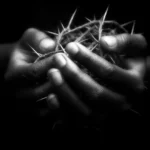“Then the LORD God formed man of dust from the ground and breathed into his nostrils the breath of life, and man became a living being.” Genesis 2:7 (NASB1995)
Imagine a world starting all over again, like a blank page waiting to be filled. In this new beginning, two machines, created to care for people, are sent to a faraway planet. They aren’t just any machines—they look and act like people, built to take care of children and make sure humanity has a fresh start. These machines, called Mother and Father, have a big job: to help children grow up in a strange, empty land.
After working hard, the machines bring six babies into the world, each one growing in special pods outside their bodies. One by one, the babies are born. But when the sixth baby arrives, something is wrong. He isn’t alive. Father, thinking logically like a machine would, suggests using the child in a practical way to help the others. But Mother refuses.
Instead, she cradles the lifeless baby close and begins to hum a soft song. Something amazing happens—tears, real tears, fall from her mechanical eyes and touch the baby’s head. Suddenly, the baby takes a breath. Against all odds, he comes to life! This tiny miracle brings hope, and the baby is given the name Campion, honoring the idea of a new beginning and a fresh chance for life.
This moment becomes a parable—a vivid reminder that true life only comes when God breathes His Spirit into what is otherwise dead. Just as the Lord breathed life into Adam, forming humanity out of the dust, this moment mirrors the divine act of creation. Without the breath of God, there is no life. Without His sustaining power, all creation is but a shell. As Job once said, “The Spirit of God has made me, and the breath of the Almighty gives me life” (Job 33:4). This same breath, this same Spirit, continues to work in every new beginning.
The machines, Mother and Father, symbolize humanity’s relentless effort to replace God with its own ingenuity. In today’s world, science and technology are often idolized as the ultimate problem-solvers. Yet even the most advanced human systems break down when confronted with the mystery of life and the depth of the human soul. In this story, it is not circuitry or programming that revives the child, but something profoundly spiritual—an act of sacrificial love, a song of sorrow, and the miracle of tears.
This echoes the reality proclaimed in Scripture: “Not by might nor by power, but by My Spirit,” says the LORD of hosts (Zechariah 4:6). Human wisdom, while valuable, is ultimately limited. The apostle Paul reminds us that “the world through its wisdom did not come to know God” (1 Corinthians 1:21). It is through the Spirit that life—and new life—is possible.
The clash between worldviews in the story—faith in a Creator versus trust in human self-sufficiency—mirrors the battle we witness daily in our culture. One side proclaims the goodness of man and our potential to save ourselves. The other recognizes, as Scripture declares, that “all have sinned and fall short of the glory of God” (Romans 3:23) and that we are in desperate need of grace and redemption.
The miracle of Campion’s life is a lesson in grace. Grace is God’s unmerited favor, His love poured out on the undeserving. Just as the child is revived not through merit or machinery but through a loving act, so God revives our souls through Christ, who “while we were yet sinners, died for us” (Romans 5:8). It’s not our works or intellect that bring us life, but His Spirit working within us. “The Spirit gives life; the flesh profits nothing” (John 6:63).
In reflecting on this story, we are reminded that humanity—even at its most advanced—cannot save itself. Only through faith in the Creator, the true source of life and hope, can we find purpose, healing, and eternal life. Like the psalmist, we too can pray, “Create in me a clean heart, O God, and renew a steadfast spirit within me” (Psalm 51:10).
Ultimately, this story challenges us to examine where we place our trust. Is our hope in algorithms and innovation, or in the One who breathes life into the dust, raises the dead, and makes all things new?
“For with You is the fountain of life; in Your light we see light.” Psalm 36:9 (NASB1995)
Devotional Song
Listen before, during and after reading the devotional.











Recent Comments